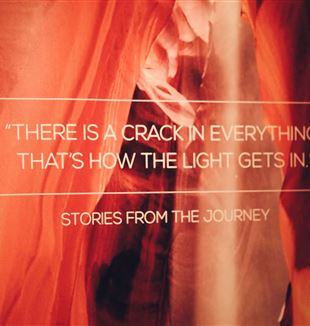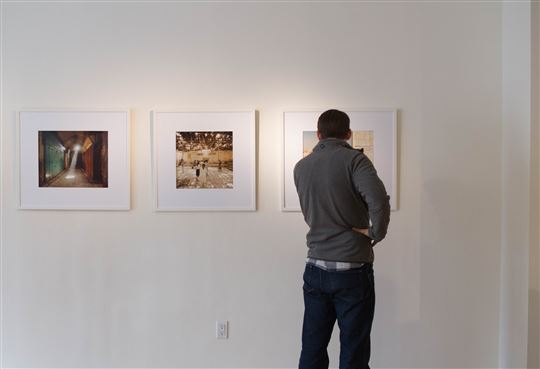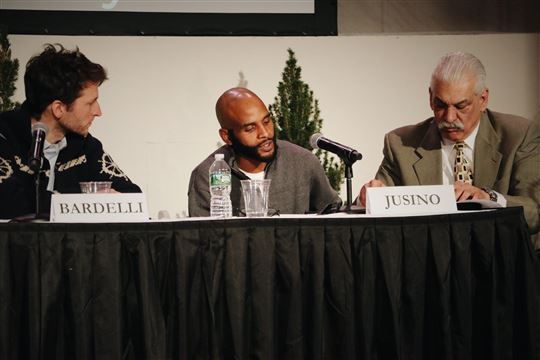
New York Encounter: The Crack Through Which the Light Comes In
The curtain has just fallen. But it seems like anything but a finished performance. The 2017 edition of the New York Encounter opened a path of friendship and of hope. Here's what happened."An encounter made up of encounters": the volunteers clear out the chairs at the Manhattan Pavillon, preparing the auditorium for the final celebration, and Angelo Sala, one of the organizers of the New York Encounter, sums up in these five words the past two and a half days that are as packed as they are short. 25 events on stage, four exhibits, 41 speakers, 313 volunteers. And a common thread: reality, which all of us face every day, which knocks on our door when and how it wants, many times with the face of a struggle or a hurt, but which always has within it a promise of everlasting good.
"Reality Has Never Betrayed Me," is the title of this year's Encounter, the ninth in the history of this New York event. It is a famous phrase by Fr. Giussani as well as a challenge for us all, especially today. "Here, we can say that those who have come have accepted this challenge," says Sala. "They have put themselves in play. And we have been able to encounter them in a real way." Sala's words echoed a message from Pope (which came with the signature of Cardinal Pietro Parolin, Vatican Secretary of State), in which he prayed that we "make a contribution to the culture of encounter, essential for the future of our human family."
The Encounter began Friday Evening with a moving testimony from Richard Cabral, an actor in film (The Counselor, A Better Life) and on TV (American Crime), but also an ex-member of a Los Angeles gang. The first 25 years of his life were involved crack, shootings, and jail, until he met someone who changed everything: Father Greg Boyle, the Jesuit head of a program for rehabilitating prisoners.
"He looked at me like I was anybody else," Cabral recalled with emotion. Without overlooking his limits, his errors, Boyle saw Cabral with the gaze of a father, something capable of giving him the strength to change his life. Today, Cabral tells his story without censuring or taking anything for granted because, he says, "if I've grown up and can share my experience with you today, it is because of what happened to me." The 900 people in the auditorium applauded, amazed. But what amazed everyone more was seeing Cabral walking around the stands of the Pavillon the next day, curious about everything.
Many of the speakers' remarks had similar themes. Brian Grim, president of the Religious Freedom and Business Foundation and a speaker at the most recent Rimini Meeting, didn't miss any of the festivities. His talk, a panel that asked about how the economy could recover "a truly human aim," included Joseph Kaboski, economist at Notre Dame; Paolo Carozza, law professor at the same university and director of the Kellogg Institute; and Carolyn Woo, outgoing president of Catholic Relief Services (the American "Caritas"). They spoke about development, about the Pope and about the gap between the real and the ideal referred to by Francis.
But above all, the speakers took note of personal experience, which was most evident in the remarks that were not rehearsed. For example, Ms. Woo - who has for a decade witnessed the pain of thousands of people helped by Catholic Relief Services - admitted that while she agreed with Fr. Giussani's remarks on reality, she did not understand them fully. "In a world where there is so much suffering," observed Woo, "the question is more acute."
Other talks on Saturday afternoon addressed suffering, war and the need to defend humanity. Monsignor Giampietro Dal Toso, ex-secretary of Cor Unum and delegate of the recently founded Dicastery for Promoting Integral Human Development, spoke about what it means in certain contexts to remain "rooted in a Presence." To show the role of Christians in the Middle East, he began with the story of Miriam, a girl who had to flee her home in Qaraqosh, Iraq, and yet had forgiven her persecutors in ISIS. "This situation is barbaric," observed Dal Toso, "but for the Church it can be the occasion to understand her nature more deeply. When everything crumbles, we need to return to the essential."
The essential also came out of the testimony by Dan Jusino, founder of Emerge - a program for the rehabilitation of prisoners - who had intended to share the stage with Steven McDonald, a policeman who was paralyzed by a shooting 30 years ago. But Steven had died three days before the Encounter. He wasn't able to share how forgiving his assailant allowed him to live a life full of grace, even in his wheelchair. But the power of his story made him a presence there, in the hall.
Another important encounter on Saturday was the beautiful dialogue between Michael Waldstein, theologian at Ave Maria University and longtime friend of the CL community in America, and John Waters, Irish columnist and social critic, whose wit shone in rare form. They discussed the Giussani's remark about reality, together with José Medina, leader of CL in the U.S. The panel examined whether Giussani's words still hold true, even in a context where we find ourselves distracted, lost, "as if we are always living elsewhere." And, the panel discussed, what allows us to widen our gaze, to recognize the positivity of reality?
These informed the exhibits at the Encounter. "I see what you see, but I see more" showcased the works of six photographers, among them Tony Vaccaro and Giovanni Chiaramnote. Other exhibits celebrated the lives of American Saints and the pedagogy of Father Giussani. "There's a Crack in Everything. That's How the Light Gets In," an exhibit on grace, borrowed its title from Leonard Cohen's song "Anthem." Three screens in a room showed the 25-minute video, made up of forty interviews in which people spoke about their life and the moments in which grace took shape in them, even through suffering.
On Saturday afternoon, everything was full - the encounters, the embraces and the stands. People filled the auditorium to attend the encounter between Timothy Dolan, Cardinal Archbishop of New York, the Jesuit Matt Malone and Claire Vouk, a student who told how the American saints she was studying had become her friends. Then there was the concert with music by Chris Vath. There were also talks on food and on work, with a testimony by Alejandro Marius, a Venezuelan social worker. Tom Colucci, a former firefighter, talked about the surprising path that led him to enter seminary after the events of September 11, and Greg Wolfe gave a talk on Flannery O'Connor.
The final day of the Encounter began with Mass celebrated by Cardinal Sean O'Malley, Archbishop of Boston and great friend of CL. That morning there were talks on the elderly, then high-level talks on science from astrophysicist Luca Matone, who spoked about the hunt for gravitational waves, and Polly Matzinger, who revolutionized studies on the immune system. In the afternoon, a wonderful preview: the presentation of Disarming Beauty, the English translation of La Belleza Disarmata that will come out in May.
There to speak about it was Julián Carrón, President of the Fraternity of CL (and author of the book), and Joseph Weiler, a law professor at NYU and a fixture at the Rimini Meeting, who made a 22-hour flight from Singapore to arrive on time. Weiler noted that after a terrible 2016 that saw the economic crisis in Europe, terrorism and the migrant crisis, the book was "a balm for the soul," something that arrived "exactly at the right time." Weiler explained that this collection by Carrón "has two audiences. It speaks to Christians, asking questions about faith, about its importance for today. And at the same time it is missionary - it speaks about relations with others, indicates something that goes beyond Christianity."
Carrón replied by speaking about the book, about how it was born precisely to respond to the challenges of the moment, to verify "if this crisis could be an opportunity for everyone and if faith, what we believe, could accept the challenge in the public sphere, or if it only has to do with something private. Does Christianity have something to offer or not?"
Weiler and Carrón also spoke about terrorism, about the emptiness found by the young immigrants in Europe, which leaves the door open for violence. Weiler pursued the role of personal responsibility, because "it seems easy to blame society, but it is not like that." And Carrón emphasized that "a father, to be such, should offer his children a hypothesis for life. We come to the world without instructions on life, on its value. We have to discover it little by little, to receive it." Without this "working hypothesis," Carrón warned, "we are condemned to live according to our reactions."
The speakers addressed the secularization in Europe and the parallels between modern Europe and the Roman Empire (where, Carrón says, "Christianity flourished not because of theories but because of the newness of life that Christians carried with them, by the way they faced everyone's challenges"). They mentioned testimony, values and family. Weiler wondered if CL had made efforts to distance itself from politics and power, and Carrón replied that the point is "what conception of power you have, whether it serves society or yourself." Then he touched on education, school, freedom.
To conclude, Weiler asked what it means to be a presence. The head of CL responded by quoting the Christmas liturgy: "the invisible became visible. Only an encounter in the present can help us grasp what Christianity is. From the beginning, starting with John and Andrew."
Time to clear out the hall and fill it again for the grand finale. Riro Maniscalco, president of the Encounter, moderated a debate on the American dream between two serious journalists, R. R. Reno, editor of First Things and former teacher of theology and ethics, and David Brooks, editorialist for the New York Times, TV personality, essayist and teacher at Yale.
It was a dialogue that moved from beauty to "psychological weakness," from the "continual distraction" to which we seem to be condemned to the fear and fragility that above all grips the youth, ("who at 20 years old invest less in friendship and more in other things," as Brooks observed). The speakers considered grace and freedom ("I didn't expect to hear so much about freedom at a Catholic meeting," Brooks admits). They bemoaned the "lack of solidarity" as one of the most serious woes of our day, and emphasized the necessity to recover a "meaning for our common life." They laughed a lot, and the editorialist from the Times, after commenting that "there are so few places where people talk about things that really matter," remarked on the impressive backgrounds of those he's just met. "Maybe," he laughed, "it would be useful to American society if there was a party of Christian Democrats." But it is clear he is not only referring to politics.
"It is the last part of the Encounter, but it is really a beginning," Maniscalco observed, closing the evening. He is right. It is the beginning of a relationship, a friendship. It is a journey to make with those who came here and want to keep following what they saw. It is "an encounter made up of encounters" in the heart of Manhattan.#NewYorkEncounter